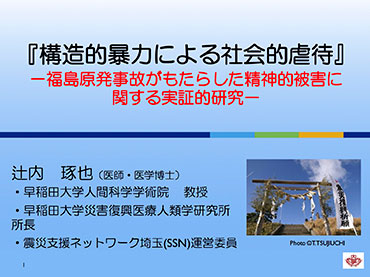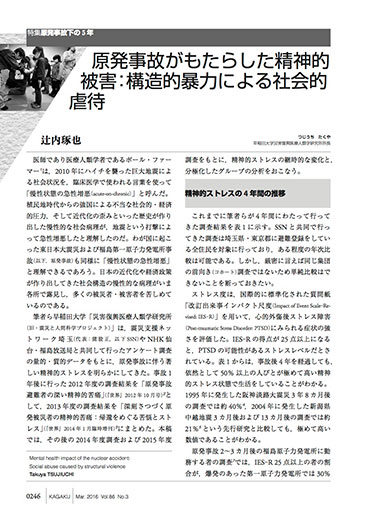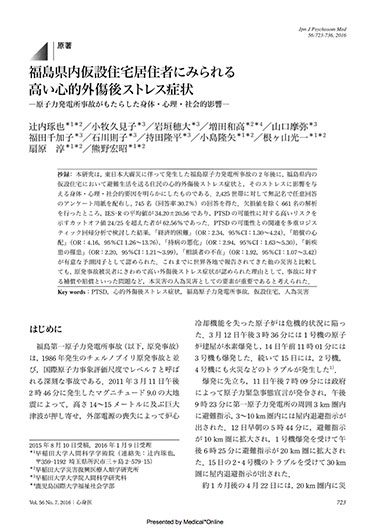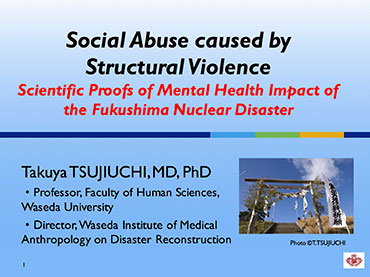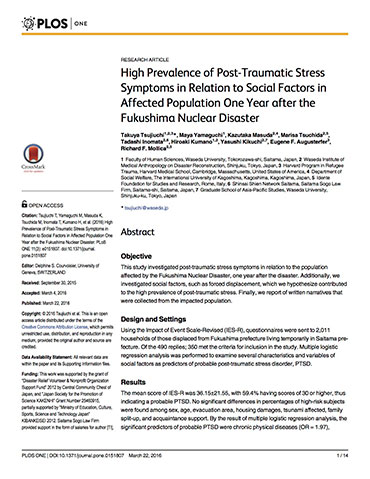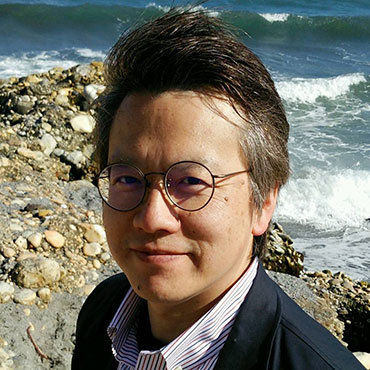講演タイトル:
構造的暴力による社会的虐待:福島原発事故がもたらした精神的被害に関する実証的研究
Title of the speech:
Social Abuse caused by Structural Violence: Scientific Proofs of Mental Health Impact of the Fukushima Nuclear Disaster
講演概要:
筆者らは、医療人類学と精神医学の観点から、福島原発事故の被災者を対象にした大規模質問紙調査を事故後毎年行なってきた。調査は、埼玉県における民間支援団体である震災支援ネットワーク埼玉(代表:猪股正、以下SSN)や、NHK仙台・福島放送局と共同で行ない、得られた量的・質的データをもとに、原発事故に伴う著しい精神的ストレスと様々な社会経済的要因を明らかにしてきた。事故1年後に行った2012年度の調査結果をPlos One Journalの論文(11(3): e0151807. 2016)にまとめ、2013年度の調査結果を日本心身医学会雑誌の論文(56巻7号・8号、2016)にまとめた。
2015年度に福島県民約1万7千世帯を対象に行なったアンケート調査の結果では、PTSD(心的外傷後ストレス障害)の可能性がある程の高いストレス度を示す者が4割を超える人々に認められた。ストレス度は「帰還困難区域・居住制限区域」からの避難者が最も高く、その次にいわゆる「自主避難者」が高かった。統計学的解析の結果、避難者のストレス度に影響を与えている因子として、「原発事故のトラウマ(死の恐怖)、地元(ふるさと)の喪失、避難先での嫌な経験」といった心理的要因と、「相談者がいない、家族関係に困難」といった社会的要因、そして「生活費の心配、不動産の心配」といった経済的要因が、複合的に関与していることが明らかになった。
このような原発事故被害者が追い込まれている状況を分析すると、「構造的暴力による社会的虐待」と考えられる状況が読み取れる。構造的暴力は、政治・経済・社会・文化などの構造に組み込まれており、社会的不正義や、生活の機会の不平等・格差・差別として現れている。原発事故という暴力によって「生活・人生・環境」に関わるすべてが根こそぎ奪われただけではなく、その後の「帰還」と「賠償」をめぐる政策決定が継続する構造的暴力となって被災者・被害者を蹂躙していると言える。避難先地域での「嫌な経験」から避難者であることを隠して生活する人も多く、被害者の置かれている状況は、社会から棄てられ、ネグレクトされ、孤立させられ、社会的な参加や活動を阻害されている、まさに「社会的虐待」を受けている状況だと言える。このような心理的・社会的・経済的に追い込まれた状況を放置することは社会的正義に反することであり、法的支援が強く求められるものである。
Abstract:
The objective of this presentation is to describe the high prevalence of post-traumatic stress disorder (PTSD) in relation to socio-economic factors in the affected population after the Fukushima nuclear disaster.
The author performed a series of large-scale questionnaire surveys from the viewpoint of psychiatry and medical anthropology. Five annual surveys were performed jointly with a private support group, “Shinsai Shien Network Saitama (SSN)” and the Japanese public broadcaster, NHK. We determined the presence of probable PTSD among evacuated residents as 67% (2012), 60% (2013), 58% (2014), 41% (2015), and 33% (2016). Using multiple logistic regression analysis, the significant predictors of probable PTSD were found to be loss of employment, economic difficulties, concerns about compensation, lost social ties and support, difficulty in family relationships, loss of homeland, victimization experiences resulting from evacuating, and traumatic experience of the nuclear meltdowns. The serious consequences of the nuclear disaster, especially many of the socio-economic factors, were linked to psychological distress and suffering. It is known that the prevalence of PTSD from a human-made or technological disaster is often higher than the rates of PTSD from a natural disaster. Further, it is suggested that prolonged uncertainty regarding the salvation of the deceased after the event might account for prolonged PTSD.
Current major issues encountered by the evacuees are: the disintegration of families and communities, and disparities in compensation among evacuation zones. Therefore, it can be determined that “structural violence” (Johan Galtung, 1969) has had a major impact afflicting victims’ lives. The main structural violence of the Fukushima disaster stems from the government policy on “reparation” and “repatriation” (plans to return victims to their homelands). The mental health problems reported by the victims are not individual or personal in origin, but rather, they should be understood as “social abuse” in the context of the government’s social responsibility for the disaster.

